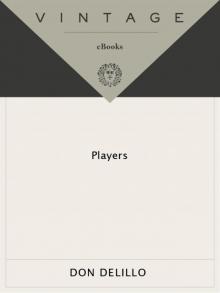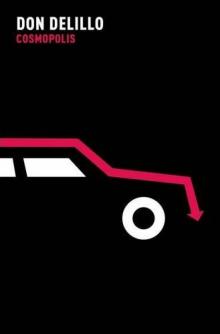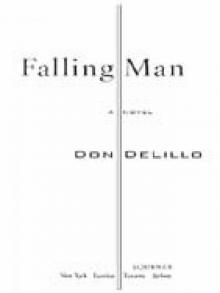- Home
- Don DeLillo
Americana Page 2
Americana Read online
Page 2
I went back to the living room. Sullivan was still talking to the round gray man. I couldn’t take my eyes off that empty shoe.
2
I was an extremely handsome young man. The objectivity which time slowly fashions, and the self-restraint it demolishes, enabled me to make this statement without recourse to the usual modest disclaimers which give credit to one’s parents or grandparents in the manner of a sires-and-dams book. I suppose it’s true enough that I inherited my mother’s fine fair skin and my father’s athletic physique, but the family album gives no clue to the curiously Grecian perspective of my face. Physical identity meant a great deal to me when I was twenty-eight years old. I had almost the same kind of relationship with my mirror that many of my contemporaries had with their analysts. When I began to wonder who I was, I took the simple step of lathering my face and shaving. It all became so clear, so wonderful. I was blue-eyed David Bell. Obviously my life depended on this fact.
I was exactly six feet two inches tall. My weight varied between 185 and 189. Despite my fair skin I tanned unusually well. My hair was more blond than it is now, thicker and richer; my waistline was thirty-two; my heartbeat was normal. I had a trick knee but my nose had never been broken, my feet were not ugly and I had better than average teeth. My complexion was excellent.
My secretary told me once that she had overheard Strobe Botway, one of my superiors at the network, refer to me as being “conventionally” handsome. We had a good laugh over that. Strobe was a small, barely humanoid creature who had the habit, when smoking, of slowly rotating the cigarette with his thumb, index and middle fingers, as Bogart did in an early film of his. Strobe hated me because I was taller and younger than he was, and somewhat less extraterrestrial. He talked often of the Bogart mystique, using Germanic philosophical terms which nobody understood, and he subverted many parties by quoting long stretches of dialogue from obscure Bogart films. He also had his favorite character actors, men whose names nobody could ever connect with a face, men who played prison wardens for seven consecutive movies, who were always attacking Japanese machine-gun nests with a grenade in each hand, who were drunkards, psychotic killers, crooked lawyers, or test pilots who had lost their nerve. Strobe seemed to admire the physical imperfections of people, their lisps, scar tissue, chipped teeth; in his view these added up to character, to a certain seedy magnetism. His world was not mine. I admired Humphrey Bogart but he made me nervous. His forehead bothered me; it was the forehead of a man who owes money. My own instincts led me to Kirk Douglas and Burt Lancaster. These were the American pyramids and they needed no underground to spread their fame. They were monumental. Their faces slashed across the screen. When they laughed or cried it was without restraint. Their chromium smiles were never ambiguous. And they rarely had time to sit down and trade cynical quips with some classy society dame or dumb flatfoot. They were men of action, running, leaping, loving with abandon. When I was a teenager I saw Burt in From Here to Eternity. He stood above Deborah Kerr on that Hawaiian beach and for the first time in my life I felt the true power of the image. Burt was like a city in which we are all living. He was that big. Within the conflux of shadow and time, there was room for all of us and I knew I must extend myself until the molecules parted and I was spliced into the image. Burt in the moonlight was a crescendo of male perfection but no less human because of it. Burt lives! I carry that image to this day, and so, I believe, do millions of others, men and women, for their separate reasons. Burt in the moonlight. It was a concept; it was the icon of a new religion. That night, after the movie, driving my father’s car along the country roads, I began to wonder how real the landscape truly was, and how much of a dream is a dream.
Strobe died in the middle of a meeting. He had a heart attack at his desk. He is conventionally dead. But he would have been happy to know that his reaction to my physical traits was shared by others at the network. Hidden energies filled the air, small secret currents, as happens in every business which thrives in the heat of the image. There was a cult of the unattractive and the clever. There were points scored for ruthlessness. There were vendettas against the good-looking. One sought to avoid categories and therefore confound the formulators. For to be neither handsome nor unattractive, neither ruthless nor clever, was to be considered a hero by the bland, a. nice fellow by the brilliant and the handsome, a nonentity by the clever, a homosexual by the lunatic fringe of the unattractive, a bright young man by the ruthless, a threat by the dangerously neurotic, an intimate and loyal friend by the alienated and the doomed. I did my best to keep low. I moved quietly close to walls and up and down the stairwells. A small incident confirmed the value of these tactics. It happened one day, after lunch, when I found myself crossing Madison Avenue stride for stride with Tom Maples, a young man who had joined the network at roughly the same time I had. We exchanged the usual cautious pleasantries. When we reached the sidewalk, a lovely teen-age girl wearing pink eyelashes asked me for my autograph. “I don’t know who you are,” she said, “but I’m sure you must be somebody.” Her smile was rather winning, and blithely I signed her fold-out map of the subway system, thinking Maples might be amused. He avoided me for the next six months. After that I did my best to be exceedingly humble and withdrawing. I felt it was essential to the well-being of others.
It’s time now to run the film again. I mean that quite literally, for I still have in my possession a movie made in those years, and many tapes as well. There isn’t much to do on an island this remote and I can kill (or rather redistribute) a fair amount of time by listening to the soundtrack and taking yet another look at some of the footage.
* * *
I went down the corridor to my office. My secretary was at her desk eating a jelly donut and writing a letter. Her name was Binky Lister. She was a cheerful girl, a few pounds overweight in a pleasant way. She was having an affair with my immediate superior, Weede Denney, but continued to be a trustworthy secretary, which means she lied on my behalf and defended me on all counts against charges made by the secretaries of men who feared and hated me. She followed me into the office.
“Mr. Denney wants you for a ten o’clock meeting.”
“What’s it all about?”
“He doesn’t tell me everything for chrissake.”
“Don’t get mad, Binky. It was just an idle question.”
Standing there she crossed her ankles awkwardly, a sort of non-facial pout. I sat behind my enormous desk and at once imagined myself naked. Then I pushed the chair back slightly and began to revolve in a magisterial 180-degree arc, surveying my land. The walls were covered with blow-ups of still photographs from programs I had written and coordinated. My bookcase was full of bound scripts. There were plants in two corners of the room and a dozen media periodicals arranged neatly on the end table. The ashtrays were all from Jensen. I had a black leather sofa and a yellow door. Weede Denney’s sofa was bright red and he had a black door.
“What else?” I said.
“A woman called. She didn’t leave her name but she said to tell you the frogs’ legs weren’t as tasty as usual.”
“My life,” I said, “is a series of telephone messages which nobody understands but me. Every woman I meet thinks she’s some kind of Delphic phrasemaker. My phone rings at three in the morning and it’s somebody stranded at some airport calling to tell me that the animal crackers have left the zoo. The other day I got a telegram—a schizogram—from a girl on the Coast and all it said was: MY TONSILS WENT TO A FUNERAL. Do you ever send messages like that, Bink? My life is a telex from Interpol.”
“If it’s all so annoying, why did you smile when I told you about the frogs’ legs?”
“It was good news,” I said.
I went around to Weede’s office. He was sitting in his restyled barber chair. For a desk he used a low round coffee table made of teak. Across the room was his three-screen color TV console. The barber chair, being an eccentricity permitted someone in Weede’s position, hadn’t bothered me muc
h, but the coffee table was a bit frightening, seeming to imply that my titanic desk was all but superfluous. Weede was a master of the office arts, specializing in the tactic of reaction. Some time after I had joined the network, a subordinate of Weede’s named Rob Claven decided to decorate his office with exactly fourteen of his wife’s paintings. It was a fairly horrifying sight. Weede didn’t say a word. But a week later a few of us, including Rob Claven, went to a meeting in Weede’s office. What we saw startled us. All the paintings and old schooner prints had vanished and in their place was hung a single eight-by-twelve-inch reproduction of a detail from the Sistine Chapel. The almost bare walls were Rob Claven’s death sentence. The Michelangelo was the dropping of the blade.
Finally Weede nodded me out of the doorway and directed me to the blue chair. He did this with a movement of hand or eye so close to imperceptibility that even as I sat down I could not determine how I knew that I was supposed to sit in the blue chair. Reeves Chubb was already there, smoking one of his mentholated cigars. Weede told us an anecdote that concerned golf and adultery. Within a few minutes five more people entered, one a woman, Isabel Mayer, and the meeting began.
I looked out the window. Men in yellow helmets were working on a building that was going up across the street. They weaved in and out of its hollow bones, shooting acetylene, and catwalked over shaky planks. Strangely they did not seem to move with any special caution. Perhaps they had come to terms with the fear of falling. They had probably seen others fall and despised those deaths for the relief that followed the shock, a relief that must have risen with the wind, floor to floor, up the raw spindling shanks of the building. What could you do but go quickly to a dark bar and drink three burning whiskies? At one level two men squatted, riveting, and another, a level above, jumped from plank to plank, his arms held out slightly, hands at hip length In mid-jump, at a certain angle against the open side of the building, he had the sky behind him, a rich and early blue, and they were framed in girders, man and sky, for what seemed an impossible second. I could see the riveters and the man jumping but they could not see each other. I watched for a long time, simultaneously trying to map the office voices and make them mean something. Then another man appeared from behind a girder, a tall man whose pants did not quite reach the top of his workboots. He stood motionless for a moment, hand canted against the rim of his helmet, shielding his eyes from the sun. He seemed to be looking at us. Then he lifted his hand above his head and began to wave. He was looking right at me, waving. I didn’t know what to do. The cool voices clicked, measuring, compromising, destroying, pressuring. I felt he had to be acknowledged. I didn’t know why but I felt it had to be done. It was absolutely imperative; a sign had to be given.
“Look,” I said. “Look at that man over there. He’s waving at us.”
“Look,” Isabel said. “He’s waving. That construction worker. Do you see him, Weede?”
Then we were all on our feet, all eight of us, crowding before the window, waving back to him. It was exhilarating. We were all waving and laughing. Weede began to shout: “We see you! We see you!” We shoved each other to get more room. Isabel was trying to climb onto the wide radiator shelf that edged out from the bottom of the window. I helped her up and she knelt there, waving with both hands now. The sky was cloudless. We were laughing uncontrollably.
We finished the meeting in high spirits. Weede suggested we all go to lunch together. Reeves Chubb begged off, saying he had a lot of work to get done, and I knew that sooner or later Weede would make him suffer for that little bit of whitewash. We went to the Gut Bucket, a nouveau speakeasy with spittoons and sawdust where you paid $4.50 for a hamburger. It was full of network people, actors and models. There were hundreds of photographs of George Raft on the wall. We sat at a circular oak table. Nobody said anything for fully three minutes. Then the waiter came and took our orders.
Across the room a very attractive couple sat drinking. Their legs touched beneath the table. I stared at the girl, trying to catch her eye. All I wanted was a brief smile, nothing more. It would have pleased me a great deal. There was an energy in me which demanded release in these small ways. To thieve one smile from that man’s afternoon. I hoarded such ego-moments, remembering every one. The nod. The pretty smile. The deep glance over the tip of the cigarette. Anything more would have been too much. I didn’t want to cause any pain.
“Good meeting,” Weede said. “Are we agreed on that?”
The waiter brought the food before we were finished with our second drinks. The place was filled with fantastic women. Weede told us about his camera safari in Kenya. He and his wife, Kitty, had spent a month there in the autumn. He said that we all had to come up to his apartment and look at the slides some time. At the network, people were always making vague invitations. Someone you hadn’t seen in months would materialize in your doorway, a seraphic image above your morning coffee. “Let’s have lunch some day,” he’d say, and that would be the end of him. Or one of your superiors, lifting his soapy head from a washroom basin, would squint in your direction and mumble: “When are you going to come over and have dinner with Ginny [Billie, Ellie, Sandy] and me?” Genuine invitations were usually delivered in secrecy, either in confidential memos or behind closed doors.
Weede excused himself before dessert arrived and he left in an atmosphere of unbending silence. We all knew where he was going—to the Penn-Mar Hotel on Ninth Avenue, where Binky would be waiting for him. They met every Thursday for an hour or so. After he’d gone Isabel decided to order a brandy and we joined her. She was a short mashed woman of forty-five or so. Four months earlier, at a party aboard a tugboat repeatedly circling the Statue of Liberty, she had gone around telling everyone she had dropped one of her pubic hairs into Mastoff Panofsky’s scotch and soda. Everybody was afraid of her. There was no logical reason for this; her job, in some obscurely defined way, dealt with fashion coordination, and she was not competitive with anyone in the entire network. Yet we all went to shameful extremes to prove our friendship and loyalty. It may have been that we sensed a dangerous feline perversity. Competitive or not, she seemed to be a woman who might attack at any moment, making no concessions at all to the etiquette of office combat. Now she began to tell us about the graffiti in the ladies’ rooms of various restaurants around town. She hit the table after each recitation. The brandies came and we talked about the winter schedule, agreeing it was first-rate. A very tall girl wearing candy-cane trousers walked across the room; her legs seemed joined directly to her shoulders. Then Reeves Chubb came in. He saw us and waved. He dropped into the vacated chair with a burst of relief that seemed worthy of some historic moment, as if he had been gouging through a rain forest for months before finding us, the lost battalion.
“Did I miss Weede?” he said. “Guess I missed him, damn it. Thought I’d come down for a quickie before tackling that China thing. What’s everybody drinking? I just heard Phelps got the ax. He doesn’t know about it yet so don’t say anything. They’ll probably wait until after the first of the year. Paul Joyner thinks he’s next. His door has been closed all morning. Hallie said he’s been calling everybody he’s ever known since high school. But he’s been saying he’s next for the last eight years. I guess he figures if he says it, it won’t happen. Reverse jinx. The last few weeks have been hell on wheels. I’ve been in the office every weekend this month. If there’s no letup soon, my child bride says she’s going home to mother. Did you read where MBO is using re-cons for the depth skeds? I ran into Jones Perkins on my way down. He said Warburton’s got some kind of rare fatal blood thing. I’d love to go to Aspen for the holidays but I don’t see how I can swing it. My secretary’s going though. I don’t know how they do it. Hallie’s going to Europe again in the spring. Have you heard what Merrill did, that perfect ass? Which reminds me. Blaisdell told me he saw Chandler Bates’ wife in San Juan last weekend. Hanging around El Convento with some tacky scuba type. Isabel, those are the most stunning gloves. If I don’t take a vacat
ion soon, you’re going to walk into my office and see nothing there but a heap of ashes. What’s everybody drinking?”
We went back to the office. In the early afternoon it was always quiet, the whole place tossing slowly in tropical repose, as if the building itself swung on a miraculous hammock, and then the dimming effects of food and drink would begin to wear off and we would remember why we were there, to buzz and chime, and all would bend to their respective machines. But there was something wonderful about that time, the hour or so before we remembered. It was the time to sit on your sofa instead of behind the desk, and to call your secretary into the office and talk in soft voices about nothing in particular—films, books, water sports, travel, nothing at all. There was a certain kind of love between you then, like the love in a family which has shared so many familiar moments that not to love would be inhuman. And the office itself seemed a special place, even in its pale yellow desperate light, so much the color of old newspapers; there was the belief that you were secure here, in some emotional way, that you lived in known terrain. If you had a soul, and it had the need to be rubbed by roots and seasons, to be comforted by familiar things, then you could not walk among those desks for two thousand mornings, nor hear those volleying typewriters, without coming to believe that this was where you were safe. You knew where the legal department was, and how to get a package through the mailroom without delay, and whom to see about tax deductions, and what to do when your water carafe sprang a leak. You knew all the things you wouldn’t have known if you had suddenly been placed in any other office in any other building anywhere in the world; and compared to this, how much did you know, and how safe did you feel, about, for instance, your wife? And it was at that time, before we remembered why we were there, that the office surrendered a sense of belonging, and we sat in the early afternoon, pitching gently, knowing we had just returned to the mother ship.

 Great Jones Street (Contemporary American Fiction)
Great Jones Street (Contemporary American Fiction) Americana
Americana Running Dog
Running Dog Libra
Libra End Zone
End Zone Ratner's Star
Ratner's Star Underworld
Underworld White Noise
White Noise Players
Players Cosmopolis
Cosmopolis The Silence
The Silence Mao II
Mao II Zero K
Zero K Great Jones Street
Great Jones Street The Angel Esmeralda
The Angel Esmeralda The Names
The Names The Body Artist
The Body Artist Point Omega
Point Omega Falling Man
Falling Man